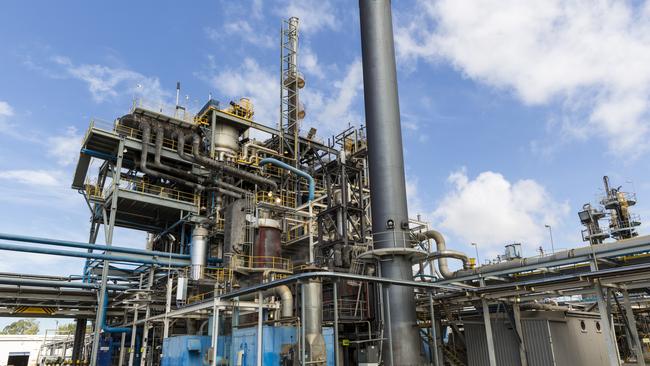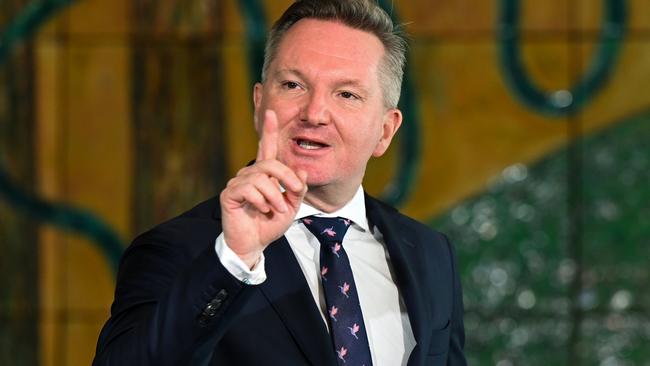Major manufacturers welcome proposed carbon border tax
Economists and business groups say a carbon border tax could fuel inflation, but major manufacturers have welcomed the start of talks to level the playing field.

Business
Don't miss out on the headlines from Business. Followed categories will be added to My News.
Economists and business groups have warned Chris Bowen’s carbon border tax could fuel inflation, but the major manufacturers have welcomed the start of consultations over ways to level the playing field on carbon emissions.
Mr Bowen on Tuesday opened up a consultation period on a so-called carbon border adjustment mechanism (CBAM), including possible tariffs on manufactured goods imported from countries that have not matched Australia’s goals of reducing emissions by 43 per cent by 2030.
The move is aimed at protecting Australia’s heavy industry - such as steel, cement and explosives manufacturers - from carbon leakage, in which industry is effectively shifted to countries with weaker emissions standards.
Australia’s major manufacturers have been calling for the introduction of such a scheme since before Labor’s safeguard mechanism was introduced, but business groups and economists warned on Tuesday the introduction of a CBAM could have an inflationary effect as it pushed up the costs of construction and some goods.

AMP chief economist Shane Oliver said the instruction of a CBAM could help level the playing field for Australian manufacturers required to decarbonise by the safeguard mechanism, but the move could also push up costs for businesses and consumers.
“Whether you impose a carbon price or whether you impose carbon reduction requirements by regulation, you will add to domestic costs in the short term,” he said.
“It can be inflationary, and any form of tariffs can be. There is a fine line between what they’re trying to do in terms of equalising costs for companies and protectionism - which could work against us in the longer term because it means that it may work against Australians getting access to lower cost products and it also has negative competition effects.”
The European Union is also introducing a carbon border tariff, initially applying to cement, iron and steel, aluminium, fertilisers, electricity and hydrogen. A transition period for the EU scheme began on October 1.
In September UBS analysts estimated the introduction of an Australian CBAM along the lines of the European model would lift the price of imported cement by about 7 per cent, rising to 18 per cent by 2030.
Major Australian construction companies import about half of their cement needs, according to UBS, and the building material is about 10 to 30 per cent of construction costs in residential and commercial buildings.
But the border tax could put even more pressure on Australia’s bloated and costly infrastructure pipeline, analysts say, where major contractors import 60 to 70 per cent of the total concrete used.
Master Builders Queensland chief executive Paul Bidwell said the concept looked “complex and costly”.
“The impact would make Australian produced building materials more cost competitive which is a good thing but therefore would increase the cost of most if not all building materials across the board,” he said.

Tom Forrest, chief executive of property developer lobby group Urban Taskforce said the cost of compliance could make housing less affordable.
““There are some communities rushing towards this without taking into consideration the impact it would have on the cost of delivery of particularly household construction which is a major problem at the moment because there is a housing affordability crisis and a housing supply crisis,” he said.
“We should be doing everything we can to address that crisis before we start imposing additional challenges and additional costs on the industry that’s supplying it, particularly where there is not an equal playing field across all nations.”
Boral is one of Australia’s biggest producers and importers of concrete, and a spokesman said the company had advocated for the introduction of a carbon border levy for some time.
“We believe the success of the Safeguard Mechanism can only be fully realised when coupled with a CBAM to stop leakage of carbon emissions from domestic manufacturers in heavy industries who are trying do the right thing and reduce emissions. With a large national footprint across Australia including large manufacturing in NSW we believe this also helps to address the social impact of the decarbonisation journey,” he said.
Other major Australian manufacturers welcomed the latest move towards carbon border tariffs on Tuesday.
Explosives maker Orica is one of Australia’s biggest manufacturers, with plants at Kooragang Island in NSW and Yarwun in Queensland, and a share in an explosives plant in the Pilbara in WA.
Orica managing director Sanjeev Gandhi said the introduction of a carbon border mechanism would help ensure Australia kept a sovereign manufacturing capability, and protect jobs in regional areas.
“Australian manufacturers are already experiencing a loss in global competitiveness from high inflation, energy pricing and wage pressures,” he said.
“A CBAM will ensure sovereign manufacturing remains competitive and, in our case, can deliver on the needs of Australia’s resources and agricultural sectors and the jobs and economies that rely on them.”
Other Australian manufacturing bosses, including BlueScope Steel’s Mark Vassella, have also previously expressed support for a carbon border levy.
But Australian Chamber of Commerce and Industry chief executive Andrew McKellar warned the consultation needed to be undertaken in a “genuinely independent and hard-headed form”.
“For any country to introduce trade barriers presents a number of problems, not the least of which is increased costs for consumers and businesses,” he said.
“Some domestic industries are undoubtedly being pressed more than others as part of emissions reduction policies, but whether carbon border tariffs are a solution is another matter. The government should not be pre-empting any policy change in this area until it has heard from all stakeholders.”
More Coverage
Originally published as Major manufacturers welcome proposed carbon border tax




